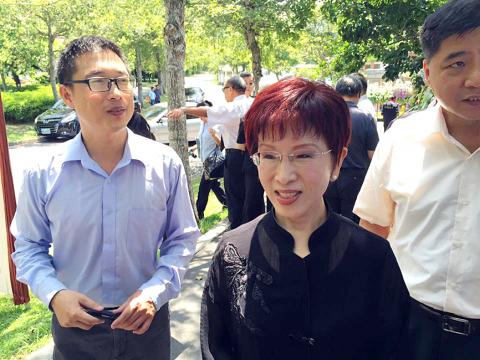Chinese Nationalist Party (KMT) Chairwoman Hung Hsiu-chu (洪秀柱) yesterday evening issued a strongly worded statement, calling the legislature’s passage of the Act Governing the Handling of Ill-gotten Properties by Political Parties and Their Affiliate Organizations (政黨及其附隨組織不當取得財產處理條例) “unconstitutional.”
“The so-called ‘Democratic Progressive’ Party used ‘majority violence’ to pass a bad law that is illegal, unconstitutional, anti-democratic and against the rule of law, in an attempt to shape a political environment for ‘one-party dictatorship’ for its selfish ends. This is a sad event for Taiwan and for Taiwanese democracy,” Hung said in the statement.
Earlier yesterday, before the bill’s passage, Hung had said the bill would push the nation’s democracy backward and aggravate social divisions.

Photo: Lin Ching-lun, Taipei Times
Hung made the remarks yesterday morning in Yilan County, on the sidelines of the funeral of former Yilan County commissioner Lu Kuo-hua’s (呂國華) mother, which coincided with the legislature’s discussion of a bill to deal with the KMT’s ill-gotten assets.
“I have reiterated several times that the KMT’s opposition to the draft bill is not tantamount to an attempt to protect our party assets. We simply do not agree with the passage of something that is illegal and unconstitutional,” Hung said.
The bill would only retard Taiwan’s democratic growth, Hung said, accusing the Democratic Progressive Party (DPP) of intensifying political divisions and causing social instability.
Criticizing the DPP as arbitrary, violent and impudent, Hung said that the KMT would like to see reconciliation between the pan-blue and pan-green camps, but it is puzzled by the ruling party’s actions.
“If the legislature uses ‘majority violence’ and passes the draft bill, the KMT will continue to survive and stride forward with a firm and steady step,” Hung said.
Separately yesterday, former vice president Wu Den-yih (吳敦義) — who is said to be interested in running for KMT chair next year — said the party should return all its assets that were not obtained in a justifiable manner, or they would forever be a “cash machine” for the DPP.
“This is not the sort of baggage the healthy and hard-working KMT should carry. Putting down the baggage in a fair and rational manner as soon as possible is the right thing to do,” Wu said.
Wu said while the KMT caucus stood little chance of preventing the DPP from passing the draft bill, the principles of justice and equality would be better upheld if the matter is addressed via filing for a constitutional interpretation instead of a political struggle.
However, the former vice president took issue with the use of the term “ill-gotten” in the bill’s title, saying that several Control Yuan members and the former DPP administration had conducted exhaustive probes into the KMT’s assets.
Additional reporting by Lin Liang-sheng.

Taiwanese can file complaints with the Tourism Administration to report travel agencies if their activities caused termination of a person’s citizenship, Mainland Affairs Council Minister Chiu Chui-cheng (邱垂正) said yesterday, after a podcaster highlighted a case in which a person’s citizenship was canceled for receiving a single-use Chinese passport to enter Russia. The council is aware of incidents in which people who signed up through Chinese travel agencies for tours of Russia were told they could obtain Russian visas and fast-track border clearance, Chiu told reporters on the sidelines of an event in Taipei. However, the travel agencies actually applied

Japanese footwear brand Onitsuka Tiger today issued a public apology and said it has suspended an employee amid allegations that the staff member discriminated against a Vietnamese customer at its Taipei 101 store. Posting on the social media platform Threads yesterday, a user said that an employee at the store said that “those shoes are very expensive” when her friend, who is a migrant worker from Vietnam, asked for assistance. The employee then ignored her until she asked again, to which she replied: "We don't have a size 37." The post had amassed nearly 26,000 likes and 916 comments as of this

New measures aimed at making Taiwan more attractive to foreign professionals came into effect this month, the National Development Council said yesterday. Among the changes, international students at Taiwanese universities would be able to work in Taiwan without a work permit in the two years after they graduate, explainer materials provided by the council said. In addition, foreign nationals who graduated from one of the world’s top 200 universities within the past five years can also apply for a two-year open work permit. Previously, those graduates would have needed to apply for a work permit using point-based criteria or have a Taiwanese company

The Shilin District Prosecutors’ Office yesterday indicted two Taiwanese and issued a wanted notice for Pete Liu (劉作虎), founder of Shenzhen-based smartphone manufacturer OnePlus Technology Co (萬普拉斯科技), for allegedly contravening the Act Governing Relations Between the People of the Taiwan Area and the Mainland Area (臺灣地區與大陸地區人民關係條例) by poaching 70 engineers in Taiwan. Liu allegedly traveled to Taiwan at the end of 2014 and met with a Taiwanese man surnamed Lin (林) to discuss establishing a mobile software research and development (R&D) team in Taiwan, prosecutors said. Without approval from the government, Lin, following Liu’s instructions, recruited more than 70 software